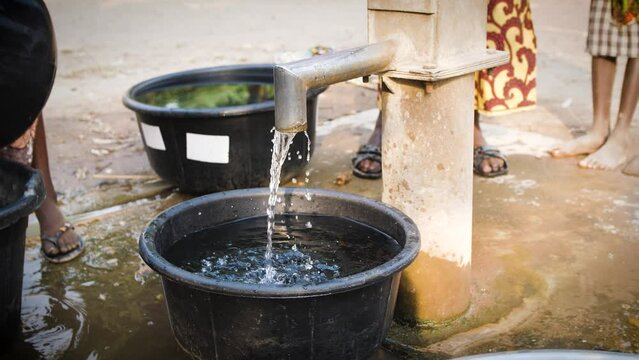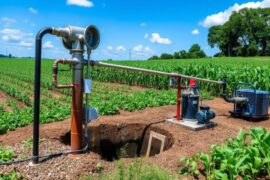Key Takeaways
- Borehole water can be safe to drink if properly managed and regularly tested for contaminants.
- Potential contaminants include heavy metals and microbial pathogens, making regular water quality assessments essential.
- Effective purification methods such as chlorination and UV treatment can enhance water safety.
- Maintaining borehole infrastructure is crucial to prevent contamination from external sources.
- Awareness of local geological conditions and potential pollutants supports informed borehole management decisions.
Understanding Borehole Water and Its Sources
Understanding borehole water and its sources is vital for guaranteeing safe drinking water in Ghanaian homes. Boreholes are constructed to access groundwater, which can be a dependable source of water if properly managed. During borehole construction, you need to take into account factors like geological formations and aquifer characteristics to guarantee ideal water quality. Groundwater can vary greatly regarding its mineral content and potential contaminants, which makes testing important. Regular assessments of water quality can help detect issues like salinity or harmful bacteria that might compromise safety. Additionally, the construction materials and techniques employed can impact the borehole’s longevity and the purity of the water extracted. By prioritizing high standards in borehole construction, you can greatly improve the water quality and safety for your household. Understanding these aspects empowers you to make informed decisions about your drinking water sources.1 Bedroom Apartment for Rent in Accra – Updated Listings
If you’re looking for a one-bedroom apartment for rent in Accra, you’re in luck! The rental market here offers diverse options that cater to different lifestyles and budgets. Neighborhoods like Osu and East Legon feature modern amenities and a lively atmosphere. You’ll want to focus on key amenities such as
Potential Contaminants and Health Risks
While boreholes can provide a reliable source of water, they are not without potential contaminants that can pose significant health risks. You need to be aware that chemical pollutants, such as heavy metals and pesticides, can leach into groundwater, particularly in agricultural areas. These substances can lead to long-term health issues, including kidney damage and developmental disorders.
Additionally, microbial contamination is a major concern. Bacteria, viruses, and parasites can enter the borehole from surface runoff or faulty casing, putting you at risk for waterborne diseases like cholera and typhoid fever. Regular testing of your borehole water for both chemical and microbial contaminants is essential for ensuring its safety.
Benefits of Using Borehole Water
Borehole water presents a sustainable and often cost-effective solution for households in Ghana, offering numerous advantages over traditional water sources. First, you can experience significant cost savings by reducing reliance on municipal water supplies or purchasing bottled water. Once you invest in a borehole, ongoing expenses may be minimal, primarily involving maintenance. Moreover, using borehole water can positively impact the environment. By tapping into groundwater, you’re lessening the pressure on surface water sources, which are often overexploited or polluted. This practice can contribute to conserving local ecosystems and supporting biodiversity. Additionally, borehole water generally requires less energy for extraction compared to the treatment and distribution of piped water, further decreasing your household’s carbon footprint.Pergola With Roof Design Ideas For Your House or Building
Uncover the extraordinary possibilities of pergola with roof design ideas and transform your house or building into something truly remarkable.
Best Practices for Ensuring Water Safety
Utilizing borehole water can substantially enhance your household’s water supply, but guaranteeing its safety is just as important as the benefits it offers. To confirm that your borehole water is safe for consumption, regular water testing is vital. You should test for common contaminants like bacteria, heavy metals, and nitrates at least once a year. This helps you identify any potential threats to your health.
Once you identify any issues, employing effective purification methods is essential. Options include chlorination, UV treatment, or filtration systems that can remove harmful impurities. Each method has its benefits, so consider your specific water quality needs and local conditions when choosing. Additionally, maintaining your borehole infrastructure, such as guaranteeing proper casing and sealing, can prevent contaminants from entering the water supply. By following these best practices, you’ll help guarantee that your family enjoys safe and clean borehole water.
Frequently Asked Questions
How Can I Test My Borehole Water Quality at Home?
To test your borehole water quality at home, you’ll need a water testing kit. Focus on key quality indicators like pH, bacteria, nitrates, and heavy metals to guarantee your water’s safe for consumption.What Are the Costs Associated With Drilling a Borehole?
Borehole drilling costs vary based on depth and location, typically ranging from $3,000 to $15,000. Installation expenses, including equipment and labor, can greatly impact your total investment, so thorough budgeting is essential before proceeding.How Deep Should a Borehole Be for Safe Drinking Water?
To guarantee safe drinking water, a borehole depth of at least 30 meters is recommended. This depth helps access cleaner aquifers, reducing contamination risks while increasing the likelihood of obtaining safe, potable water for your home.Can Borehole Water Affect My Plumbing System?
Yes, borehole water can affect your plumbing system. Without proper water filtration and regular plumbing maintenance, you might encounter issues like sediment buildup or corrosion, leading to costly repairs and reduced efficiency in your water supply.What Permits Are Required to Drill a Borehole in Ghana?
To drill a borehole in Ghana, you’ll need to comply with borehole regulations and obtain the necessary drilling permits from local authorities. These steps guarantee sustainable water access and protect groundwater resources.Conclusion
In summary, while borehole water can be a reliable source for households in Ghana, it’s essential to recognize potential contaminants and health risks. Regular testing and proper maintenance can greatly enhance its safety for consumption. By implementing best practices, you can guarantee that your family enjoys the benefits of borehole water while minimizing health risks. Ultimately, staying informed and proactive about water quality will empower you to make safer choices for your home.Discover more from Ghana Scoop
Subscribe to get the latest posts sent to your email.





